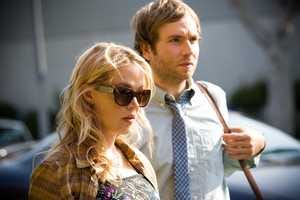Screenwriter Thomas Moffett, "Shrink"
Thomas Moffett did something a lot of fledgling screenwriters don't, and I don't just mean sell a script. He hit the big-time with his first full-fledged major release, pulling two of Hollywood's biggest names: Kevin Spacey and Robin Williams, for his small indie film "Shrink," which tells the tale of a Hollywood psychiatrist and the patients he treats.
Moffett is returning to his home state of Indiana for Q&A sessions before the Friday and Saturday 7:30 shows at the Keystone Art Cinema in Indianapolis, and took some time to chat with the Yap about his film, making it in Hollywood without living there, and on securing the big names for his film.
The Yap: How did you get involved in this project?
TM: Well, I was approached by a guy who is a producer of the film. He had read a couple of other screenplays I'd written that had gotten close to being made a few years back and had been floating around LA. He was married to one of my good friends from New York, and she put my most recent screenplay in front of him, and he liked it a lot, but called me up and said "I have this idea for a movie," so he gave me a very loose kind of thumbnail sketch of the sort of archetypal characters that are in "Shrink."

So I spent about three months just staring at it, not sure of what I wanted to do with it, and one day it just sort of clicked, and I was really interested in this idea. It went really fast, and he got excited about it and started sending it around. Eventually it got to Kevin Spacey, and once Kevin signed on it really kick-started everything. So it was about getting my work to the right people, then them getting it to the right people, and trying to make opportunities happen.
The Yap: You mentioned Kevin Spacey. How did he get involved?
TM: He was given the script, and it took awhile. He was working on a film, and he's the artistic director of the Old Vic in London, so he's a busy guy. It took a couple of months before he read it. Then all of a sudden we got a call and they said he read it and liked it.
The Yap: You had a small role on the film, right? I know a lot of times writers are not even welcome on set. Were you on set a lot?
TM: Well, I was lucky in that I was able to be there. I do have a small part. I play the director of the film-within-a-film we do, and I basically yell, "Cut!" and have one line of improv. But I was lucky. Jonas Pate was the director, and he is really a collaborative guy. I told him "I'm here for you and I'm here for the movie. Tell me what you need. He said "Just be there." He and the actors and I would work on scenes together, and I was on hand to handle the dialog. We would just be there side by side. It's very unusual for the writer to be that involved.
The Yap: So you're from Indiana. How does one come from Indiana and end up a screenwriter?

TM: I don't know, man. I always wanted to live in New York, and I figured out where I wanted to go to college, and NYU was my top choice, so I came here, and I've been here ever since. I had those romantic ideas of New York, and it's really lived up to all of my ideas and then some. I started working in college for a literary magazine called the Paris Review, which was run by George Plimpton, and he was a major mentor for me. I worked there for three years after college until he passed away.
I was in contact with a lot of professional writers, and I got to meet pretty much every living writer that I idolized. I just thought "I've got to give it my best shot here." I got to be around all of these people who were making their living as writers, and living these great lives, and I got to be around that. And a lot of the young people who were around me at the time, at the time we all had those aspirations, so there was a nice energy. And screenwriting was something I always had an interest in, and I got to meet Wes Anderson when a friend of mine was working for him. And, you know, just doing a lot of writing, and being in the right place at the right time.
The Yap: From a writing perspective, you have a lot of characters to juggle in this film that all have these interconnected stories. How did you work within that framework to keep the film coherent and entertaining?

TM: It's tough. There are a lot of characters. When I was given the initial treatment, there were certain mandates and marks I had to hit. The producers wanted a certain number of characters, but I came up with the story and how they all fit together my own way.
What anchors them all is Kevin Spacey's character. The characters are all his patients, or are tangentially related to the patients, so they all end up connected. Any time you do that you run a risk bringing those characters together. You have to use more movie logic and not necessarily realism. There are times when things realistically are a little bit of a stretch, but emotionally it fits. You have to get them together one way or the other, so there's a heightened sense of reality there. But you have to make sure you don't overplay it or be too heavy-handed in it.
The Yap: And the other side of the film is that it's based in Hollywood, so there's that aspect.
TM: Yeah...it's funny. Anytime anyone says it's too "insider" or "too Hollywood" I've always taken that to be a bit of a compliment, because I'm not an insider by any stretch of the imagination. I grew up in Indiana, I live in New York. I've never lived in LA, though I've spent large amounts of time there over the years. But I want to create good characters, and a good writer can pick up on the way people talk in different situations, There's a Hollywood lingo that's not that hard to pick up if you keep your ears open. I wanted to write a movie about people, and about problems and loss and the way that people help each other. Hollywood is just the backdrop of it. It's nice to see it play in towns other than Hollywood and have people pick up on the themes. I didn't want to make "Entourage" or something like that.


